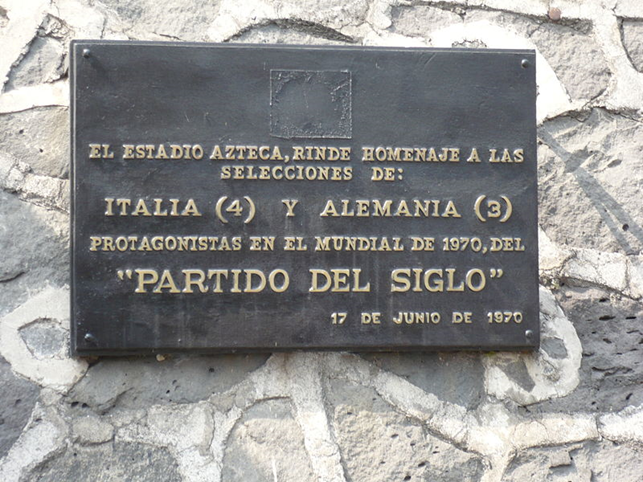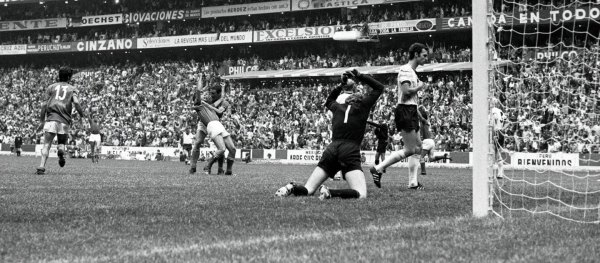It is not a sad event, on the contrary, it is a moment of joy, it is an event that has become a part of our history even if at first glance it may seem to have little meaning. It's an event about which we think: “Where was I when it happened?” (obviously if you are around 60 or more). Well yes, it's a football match, but not a common match, it's THE football match.
We are great sports fans but we do not practice much. In Italy, football is definitely the king of sports. There are sports that come and go, depending on the success of Italian sportsmen: tennis, rugby, skiing, basketball, swimming. And, in the end, motorcycles and cars, Valentino Rossi and Ferrari, these are myths that will never die. But we are almost all football fans.
You know, we're parochial because we're individualists, few things unite us, one of them is the national football team. Football in Italy is an ancient thing. It came from England at the end of the 19th century, when British sailors, in the moments of break, played on the docks, admired by an audience of curious. In 1910 the Azzurri, the National Team, was born: Azzurri, light blue, the color of the house of Savoy which ruled Italy.
The first World Cup was held in Uruguay in 1930. The idea of a national team championship came to a French, Fifa president Jules Rimet (French, on the other hand, was also the founder of the modern Olympic Games, Baron Pierre de Coubertine). Inspired by the success of the Olympic tournaments of 1924 and 1928, Rimet proposed the organization of a football World Cup. Uruguay was the only country offering to organize the tournament and pay for food, accommodation and travel of the other National Teams. 13 teams participated: 7 from South America, 4 from Europe (Italy was not among them) and 2 from North America (among the absentees, the English: "Football was born here," they said, "we are already world champions)." Uruguay won 4-2.
After the success of the first edition, Italy did everything possible to host the 2nd World Cup, in 1934. Mussolini's regime was on the rise and needed a bath of popularity. It was played at home, with Mussolini in the stands and the inevitable cascade of criticism. Italy won, but the other countries accused the Duce of influencing referees.
In 1938, the Championship was played again in Europe, this time in France. Again, fascist propaganda monopolized the event: the Italian national team showed up on the field in black jersey and during the anthem all players saluted the Roman way. The team was strongly contested (in the stands of the French stadiums there are many Italian exiles, fleeing the regime), but still managed to win the title again. For Mussolini it was a triumph, but the French World Cup was also the last show of international brotherhood before the outbreak of WWII: the 1942 edition will never take place and the next World Cup will not be played again until 1950, in Brazil.
From 1950 to 1966 Italy was eliminated four times, in 1962 by North Korea, resulting in a national mourning, and did not participate once. And here we are in 1970, the Mundial, the World Cup in Mexico.
Italy vs Germany, June 17th 1970, a semifinal, now almost half a century ago: a collective event that divides those who saw it - or were at least conscious enough to remember it, and I am among them – from those who did not. Germany, or rather West Germany, because Germany was still divided. Scrolling newspaper articles of the time we smile now but then it was not so, it was a football match but not only that: German players were called panzers, as if they were Nazi tanks. War was evoked, obviously: WWII had ended only 25 years earlier, in 1970 it was like something happened to us in 1994: not yesterday, let's say the day before yesterday.
We were European Champions, the German were vice World Champions, they had been beaten in 1966 by Bobby Charlton’s England. But beside that, any match with Germany was (and still is) something more, something that transcends sports. A challenge between two opposites that still today - and probably tomorrow - attract and repel indefinitely. The Germans: united, methodical and compact; the Italians: individualists, talented but defensive.
The Mexican World Cup was a watershed in the world of football, for Italians. Mainly because it was the dawn of sports on television: Mexico ‘70 was the first event fully broadcast in our homes, something that had not happened for the English World Cup of 1966. Mediawise, football began to show some of the characteristics it has today.
Italy vs Germany was made even more epic by the local time: yes, because in Mexico the kick-off was at 5 p.m., in Italy with the time difference it was broadcast live around midnight. It was not yet the time of weird time schedules, to match the times of the continent where it is more popular, Europe, it was a football still not fully subordinated to advertising.
The Italian team started immediately with an aggressive attitude and after less than ten minutes, Boninsegna scored. From this moment on, up to two and a half minutes after the 90th, the Azzurri defended themselves with order and resisted the German attacks. But in the 92nd minute, Grabowski crossed to the centre and Schnellinger, completely alone in the area, scored comfortably. Schnellinger, damn it. Karl Heinz Schnellinger, AC Milan's player at the time, blond, more German than Oktoberfest. He had not scored for the national team yet, he never will. But we must be grateful to him: if he had not scored, no game of the century, we would have gone to the final without suffering. A few years later they asked him about those moments. He answered: "I found myself buried by the hugs of my teammates. When I got up I didn't dare to look at Rosato, my teammate at AC Milan, in the eye. And the others...". The others? "They sent me to hell!"
The draw benefitted the Germans, who regained their energy and began to believe in victory. Until here, not a game to be remembered as “historic”. But now, its’ overtime, 2 halves of 15 minutes each. In the 6th minute of the first extra half, due to a defensive mess, Muller scored: 2-1. And it was an icy shower for the Azzurri. But just three minutes later, inside the penalty area, Tarcisio Burgnich, a defensive player, decisively not a talented attacker, scored: 2-2. Another player who scored only rarely. A few more minutes and in the 13th of the first extra time Riva scored with his famous left: 3-2. Meanwhile, as if to turn the game into an even more epic event, Germany’s stoic captain Franz Beckenbauer played both overtimes with a conspicuous bandage on his shoulder, dislocated during the match.
As if inspired by their captain’s attitude, the Germans once again attacked and on the 5th of the second overtime, Muller brought the match back to parity: 3-3. The Mexicans on the stands were completely ecstatic. Players were exhausted on the field, Italians were exhausted at home, the Germans too in Germany, I guess. But fate was lurking. Italy started again, the ball was thrown inside the penalty area and Rivera scored. It was the final 4-3. 
“Basta”, enough, we couldn't stand it anymore. And the game ended. History was made, and history became myth; the players’ names were carved in our minds since then: Rivera, Riva, Boninsegna, Albertosi. In the years that followed, when each of them passed away, it was as if we were losing a relative. The match was so iconic, even for Mexicans, that a plaque will be dedicated to its memory in the monumental Azteca stadium in Mexico City: "El Estadio Azteca rinde homenaje a las selecciones de Italia (4) y Alemania (3) protagonistas, en el Mundial de 1970, del PARTIDO DEL SIGLO. 17 de junio de 1970”. How many matches are celebrated by a plaque in the stadium where they took place? Few.
With the extra time ending at around 2 a.m., Italians invaded city streets, carousels, flags onboard countless Fiat 500s. Yes, because we were in the final, but above all we had defeated the "panzers". It was a sort of parable of real life: though cornered, Italy always emerges victorious by the skin of its teeth, or so we like to believe, because it is not so true.
In the final, the cynical and cheeky Italians, very tired, faced the great Brazil and played for over an hour. 1-1, then they collapsed physically and were overwhelmed by the Brazilians. However, who cares, the Brazilians never won "el partido del siglo".
P.S. if you want to see the goals, look for the video in our VIDEO section https://www.vitoritalytours.com/video.html

